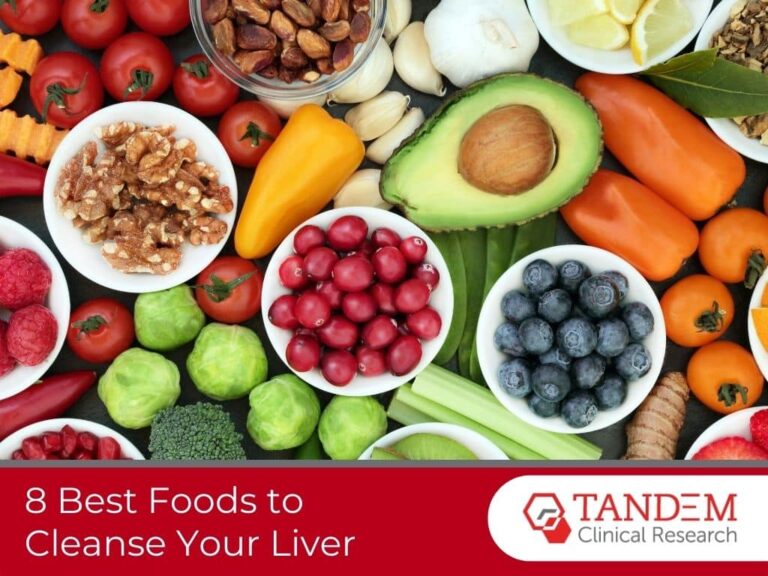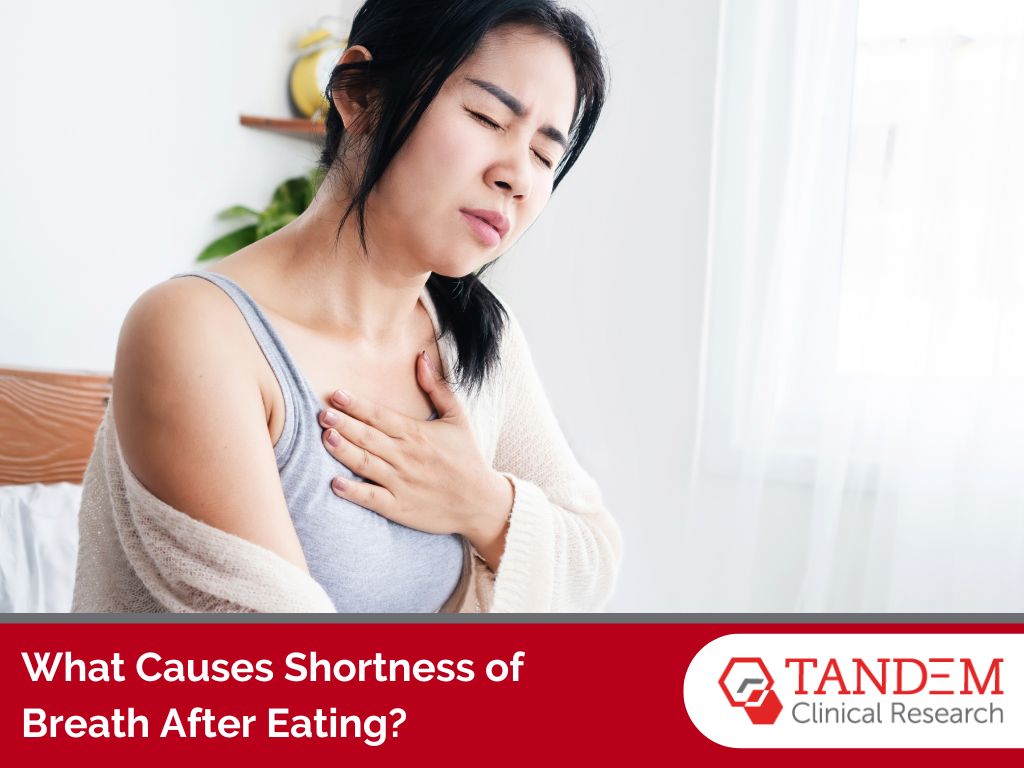
If you’ve ever felt like breathing was a challenge after a meal, you know how distressing the sensation can be. Shortness of breath after eating can be related to a range of conditions and usually feels like a tightness in your chest or, in some cases, a sense of suffocation.
Although these symptoms can be alarming, there are usually treatable causes behind them. To prevent shortness of breath in the future and to understand what’s going on, you’ll need to get to the root of these underlying triggers.
Here’s what you need to know about shortness of breath after eating, what causes it, and how you can protect your health going forward.
Common Culprits of Shortness of Breath After Eating
Overeating

Eating too much (often too quickly) can lead to shortness of breath due to the increased pressure it places on the diaphragm and the stomach.
When you consume more food than your stomach can comfortably accommodate, it expands, putting pressure on surrounding organs, including the diaphragm – a dome-shaped muscle beneath the lungs.
As the stomach expands, it pushes against the diaphragm, limiting its ability to move freely and compressing the lungs. This compression restricts the lungs’ capacity to expand fully, resulting in a sensation of breathlessness or difficulty breathing.
Moreover, digestion requires energy and diverts blood flow to the digestive system, including the stomach and intestines. This redirection of blood flow away from other organs, such as the lungs, can exacerbate feelings of breathlessness.
Recommendations:
- Eat Smaller Meals: Break your meals into smaller, more frequent portions to avoid overfilling your stomach. Aim to eat five to six smaller meals throughout the day instead of three large ones.
- Chew Thoroughly and Eat Slowly: Take your time to chew food thoroughly and eat slowly to give your body time to process the food and avoid overwhelming your digestive system.
Gastroesophageal Reflux Disease (GERD)
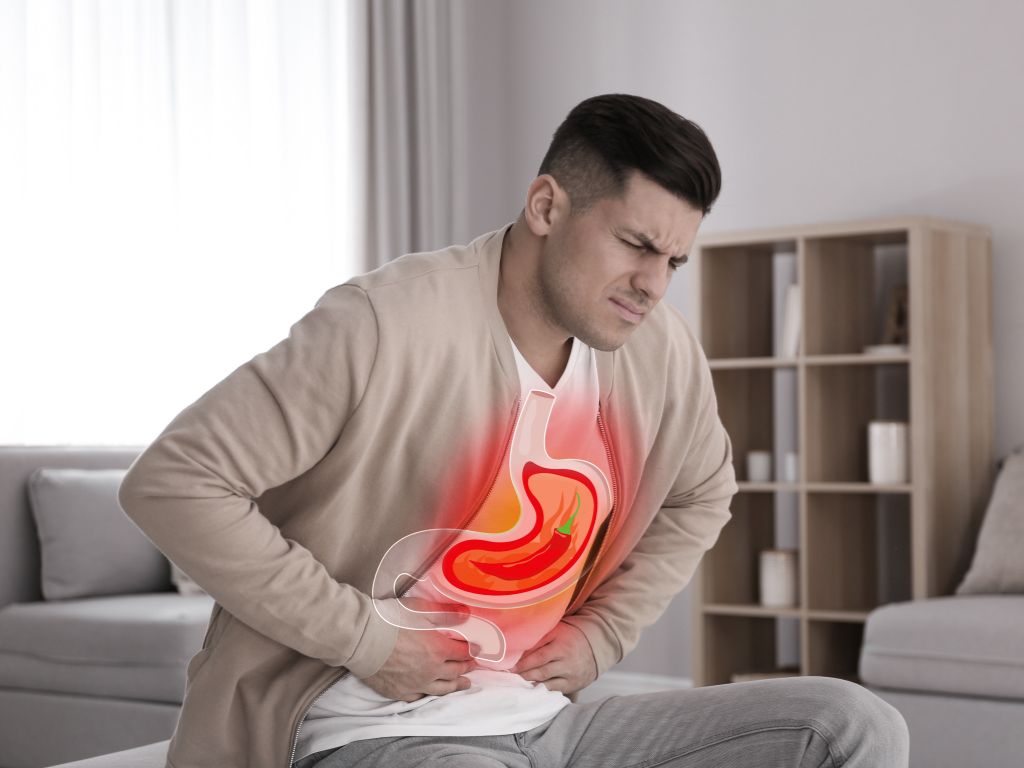
Gastroesophageal reflux disease is a chronic (and common) condition in which stomach acid flows back into the esophagus, causing irritation and inflammation. It affects about 20% of people in the United States, making it a leading potential cause of shortness of breath after eating.
The frequent reflux of acidic contents can sometimes reach the upper airways and even the lungs, contributing to respiratory symptoms such as shortness of breath.
In some cases, GERD also causes shortness of breath by triggering bronchospasms – sudden contractions of the smooth muscles in the airways. These can narrow the airways, making it difficult to breathe.
The reflux of stomach acid into the esophagus can also lead to the aspiration of these acidic contents into the lungs – a condition known as aspiration pneumonia. When stomach acid enters the lungs, it can irritate the delicate lung tissues and trigger inflammation, leading to respiratory symptoms.
Recommendations:
- Avoid Trigger Foods: Identify and avoid foods that trigger acid reflux, such as spicy foods, citrus, chocolate, and caffeine. Keeping a food diary can help track which foods exacerbate your symptoms.
- Elevate Your Head: Use an extra pillow or a wedge to elevate your head while sleeping, which can help prevent acid from flowing back into the esophagus.
Food Allergies & Intolerances (Celiac Disease)

The American College of Allergy, Asthma & Immunology estimates that about 4% of adults in the U.S. have a food allergy. Food allergies and intolerances, including conditions like Celiac Disease, can lead to shortness of breath through various pathways, primarily involving the immune system and the digestive tract.
When an individual consumes a type of food to which they are allergic, their immune system identifies the food proteins as harmful and launches an immune response. This response can trigger the release of chemicals such as histamine, which can cause inflammation and constriction of the airways, leading to symptoms like wheezing and shortness of breath.
Allergic reactions can also lead to swelling of the throat and tongue, further restricting airflow and causing difficulty breathing.
Similarly, in the case of Celiac Disease (an autoimmune disorder triggered by gluten consumption), the immune system reacts abnormally to gluten – a protein found in wheat, barley, and rye.
Although this response primarily targets the lining of the small intestine, Celiac Disease can also present with extra-intestinal symptoms, including respiratory issues such as shortness of breath.
Recommendations:
- Identify Allergens: Work with an allergist to identify specific food allergens through testing and eliminate them from your diet. Carry an epinephrine auto-injector if you have a known severe food allergy.
- Gluten-Free Diet: If you have Celiac Disease, strictly adhere to a gluten-free diet to avoid triggering immune responses that can affect your respiratory system.
Asthma

Asthma is a chronic respiratory condition characterized by inflammation and narrowing of the airways. It can often result in symptoms such as wheezing, coughing, chest tightness, and shortness of breath.
Although asthma symptoms are commonly triggered by environmental factors like pollen, dust, or pet dander, certain foods can also exacerbate asthma symptoms and cause shortness of breath – a phenomenon known as food-induced asthma or exercise-induced bronchoconstriction (EIB).
After eating large meals or foods high in certain triggers (like sulfites, histamine, or preservatives), some individuals with asthma may experience shortness of breath for a couple of reasons.
First, certain foods can contain allergens or chemicals that trigger an allergic or inflammatory response in the body, leading to airway inflammation and constriction. Additionally, some foods may contain substances that directly irritate the airways, such as spicy foods, strong odors, or acidic foods like citrus fruits.
Secondly, the act of eating itself can induce shortness of breath in individuals with asthma. During digestion, blood flow is redirected to the digestive system, leading to increased blood flow to the stomach and intestines and reduced blood flow to other organs, including the lungs. This redistribution of blood flow can temporarily impair lung function and exacerbate asthma symptoms.
Recommendations:
- Avoid Trigger Foods: Identify and avoid foods that trigger your asthma symptoms, such as those high in sulfites, preservatives, or allergens. Consult with a dietitian if necessary.
- Use Medication: Keep your prescribed asthma medications, such as inhalers, readily available during meals to manage any sudden onset of symptoms.
Obesity

Being significantly overweight can contribute to shortness of breath through various mechanisms, primarily involving increased pressure on the diaphragm and reduced lung capacity.
When individuals are overweight or obese, the excessive accumulation of fat around the abdomen can compress the diaphragm, the primary muscle involved in breathing. This compression limits the diaphragm’s ability to move freely during breathing, leading to a sensation of breathlessness, particularly after consuming a large meal when the stomach expands and further encroaches on the limited space available for the diaphragm to contract effectively.
Furthermore, obesity is often associated with reduced lung capacity and decreased respiratory function due to several factors, including decreased lung compliance, increased airway resistance, and impaired gas exchange. The excess fat stored in the chest and abdominal areas can compress the lungs and reduce their ability to expand fully during inhalation, leading to shallow breathing and a feeling of breathlessness.
Recommendations:
- Weight Management: Implement a weight loss plan that includes a balanced diet and regular exercise to reduce abdominal fat and improve respiratory function. Consult with a healthcare provider for a tailored weight loss strategy.
- Monitor Portion Sizes: Be mindful of portion sizes to avoid overeating and further compressing the diaphragm. Eating smaller, balanced meals can help manage both weight and respiratory symptoms.
Uncommon Causes & Lesser-Known Factors
Although the causes we just listed are the most common triggers behind shortness of breath after eating, there are other potential triggers.
For instance, shortness of breath after eating can sometimes be attributed to rare conditions such as eosinophilic esophagitis, a chronic immune-mediated disorder affecting the esophagus.
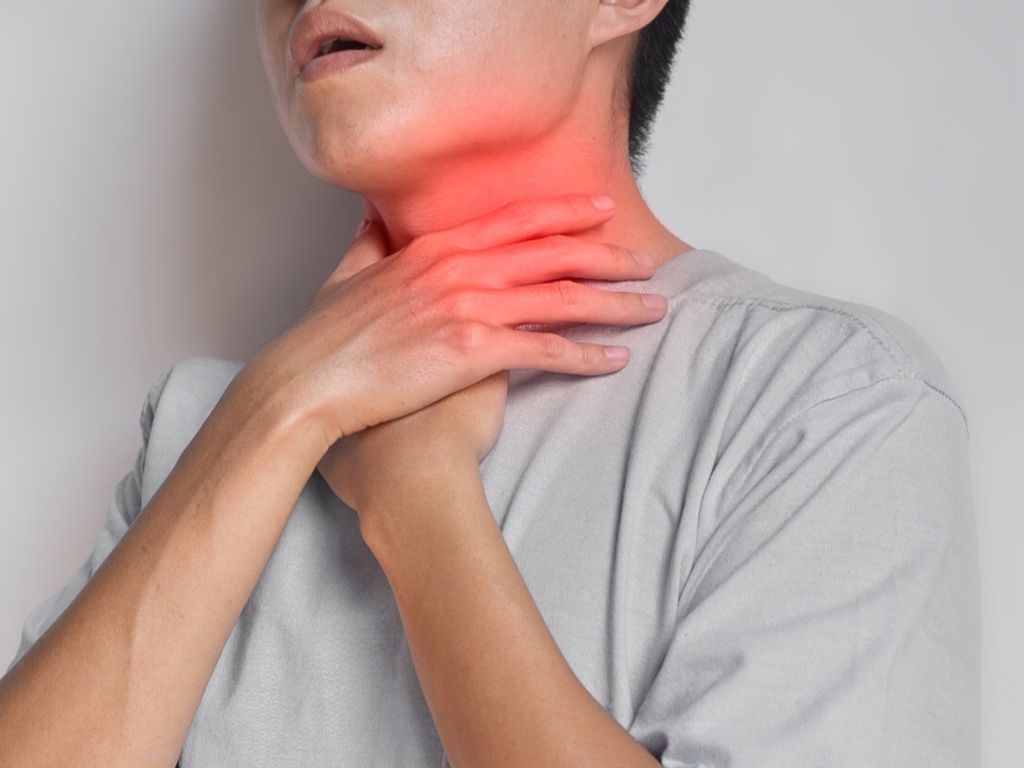
Additionally, certain neurological conditions affecting the swallowing process, such as achalasia or dysphagia, can result in food getting stuck in the esophagus, triggering respiratory symptoms.
If you don’t have any of the conditions just discussed, you may be dealing with high levels of stress and anxiety. Both can exacerbate feelings of breathlessness, especially during or after meals, due to the body’s heightened physiological response to stress.
Certain medications, particularly those affecting the respiratory or gastrointestinal systems, can also have side effects such as shortness of breath or difficulty swallowing, which may become more pronounced after eating.
It’s important to consider these less common causes and factors, especially if the symptoms persist or worsen over time. Talk to your healthcare provider to get to the root of your concern before seeking any treatments or making significant lifestyle changes.
When Is Shortness of Breath a Cause for Concern?
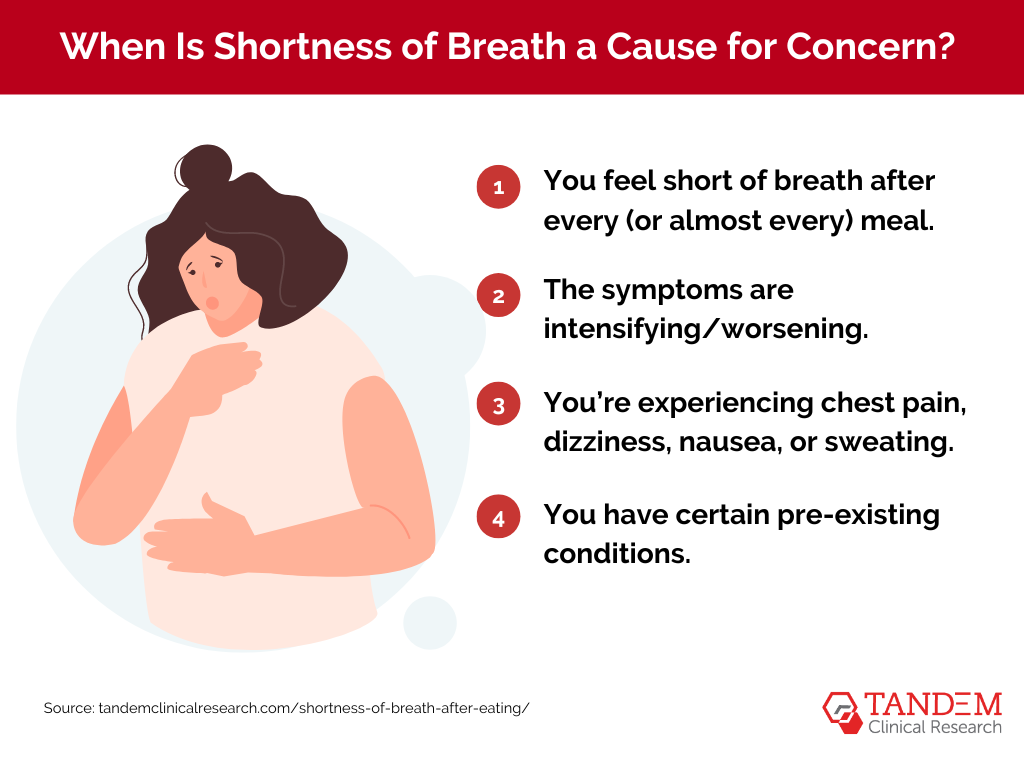
Occasional shortness of breath is not necessarily alarming, but if you experience persistent breathlessness after most meals, it could be a sign of a serious underlying health issue that requires medical attention.
It’s always a good idea to pay attention to your body’s responses after eating, but you should certainly speak with a healthcare provider if…
- You feel short of breath after every (or almost every) meal
- The symptoms are intensifying/worsening
- You’re experiencing chest pain, dizziness, nausea, or sweating
- You have certain pre-existing conditions
Regular monitoring and timely medical intervention are crucial when it comes to preventing many complications. Don’t wait to let your healthcare provider know what you’re experiencing.
Seeking Medical Help and Diagnosis
Your healthcare professional can conduct a thorough evaluation to get to the root of your shortness of breath. This will likely include obtaining a detailed medical history, a physical examination, and diagnostic tests such as…
- Pulmonary function tests
- Chest X-rays
- Electrocardiograms (ECG)
- Endoscopies
- Allergy testing
- Blood testing
Upon diagnosis, your healthcare provider may recommend lifestyle modifications and treatments to target your underlying cause.
Lifestyle modifications may include dietary changes to avoid trigger foods, as well as strategies for reducing stress and losing excess weight. Medical treatment, on the other hand, may involve prescriptions for bronchodilators or anti-inflammatory drugs.
In some cases, you may be referred to specialists such as pulmonologists, gastroenterologists, or allergists for further evaluation and management.
Help Researchers Study Causes of Shortness of Breath
If you’ve been experiencing shortness of breath after eating, you may be able to contribute to vital research on symptoms and conditions similar to yours.
Clinical trials help researchers and scientists advance research on many kinds of health conditions, including those that cause shortness of breath. These trials aim to investigate the effectiveness and safety of new treatments, medications, or interventions for conditions such as asthma, GERD, food allergies, and obesity-related respiratory issues.
Although clinical trials may come with some risks, they are generally considered safe and are conducted under strict guidelines and regulations, with measures to protect participants’ rights, health, and overall well-being.
By participating in a clinical trial, you have the rare opportunity to contribute to the development of innovative treatments and therapies – for yourself, but also for others who are (or will be) in your shoes.
Get Matched With Tandem Clinical Research Today
Regardless of why you’re experiencing shortness of breath after eating, take the symptoms seriously and assess potential triggers.
At Tandem Clinical Research, we match thousands of people with clinical trials throughout Louisiana, New York City, and central Florida. We believe research is the remedy, and people like you are vital to medical progress.
Find out if you qualify for a medical research study today.
Updated: September 2, 2024

